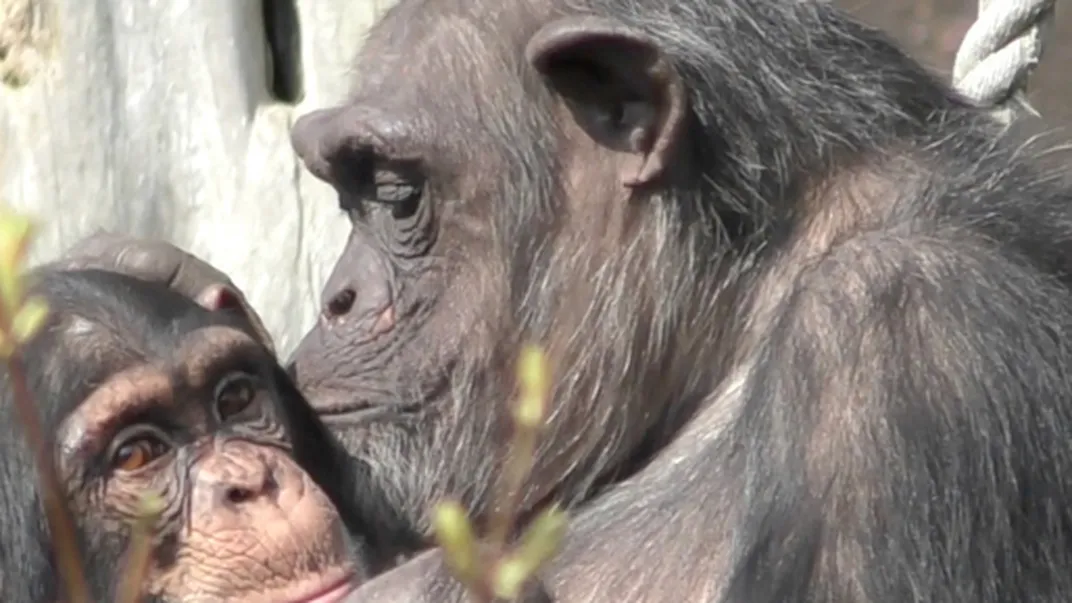Chimpanzees and Bonobos May Remember Faces for More Than 20 Years
The great apes, which are humans’ closest living relatives, appeared to recognize photos of their former acquaintances in a study, even decades later
:focal(2880x1920:2881x1921)/https://tf-cmsv2-smithsonianmag-media.s3.amazonaws.com/filer_public/a6/29/a629229c-9782-4d21-b5d4-96310142e0d6/027a2815.jpeg)
Chimpanzees and bonobos appear to recognize the faces of their former companions—even those they haven’t seen for decades, according to new research.
The findings, published Monday in the journal Proceedings of the National Academy of Sciences, suggest these primates have the longest “social memory” of any animal, besides humans.
Chimpanzees and bonobos are humans’ closest living relatives, so the findings could offer insights into how our own social memory evolved. With the recent study, the researchers “time-traveled seven million years ago into the mind of our common ancestor we had together, in a way we’d never done before,” says Brian Hare, a cognitive scientist at Duke University who was not involved in the research, to the Washington Post’s Dino Grandoni.
Scientists have long known about great apes’ stellar memories. Past research has found they can recall scenes from movies and keep track of the locations of their favorite fruit trees.
Additionally, study co-author Laura Simone Lewis noticed that when she revisited apes she had worked with before, the animals appeared to recognize her. For instance, she became friendly with a male chimpanzee named Kendall while conducting research at the North Carolina Zoo as an undergraduate. Whenever Lewis came around, Kendall gently inspected her fingernails.
Later, when she returned to the zoo after spending the summer in Africa, Kendall greeted her and indicated that he wanted to look at her hands.
“The feeling I got was that he clearly remembered me after four months away,” says Lewis, a comparative psychologist at the University of California, Berkeley, to the New York Times’ Carl Zimmer. “But I didn’t have the data to prove it.”
So, to confirm her suspicion, Lewis and her colleagues decided to officially test the creatures’ social memories. They studied 15 chimpanzees and 12 bonobos living in captivity in the United Kingdom, Belgium and Japan. One by one, they showed each animal side-by-side photos of two different apes—one was a stranger, while the other was a group member the subject had lived with at least one year prior.
Scientists displayed the pairs of images for three seconds each and recorded the animals’ gaze with eye-tracking technology. (The primates got a tasty treat of fruit juice to sip on during the experiment, which encouraged them to keep their heads still.) When they analyzed the data, the researchers saw that the chimps and bonobos stared at the photos of their former acquaintances for 11 to 14 percent longer than they looked at the photos of strangers, per New Scientist’s Chen Ly.
“It’s not so different from walking down the streets in a major city, unexpectedly encountering someone you went to school with, and you do that double take,” says study co-author Christopher Krupenye, a psychologist at Johns Hopkins University, to New Scientist.
The animals gazed even longer when one of the photos showed an individual they used to be especially friendly with. In some instances, the animals appeared “mesmerized” by the image of a relative and stopped drinking their juice altogether as they gawked, according to a statement.
One bonobo, named Louise, appeared to recognize photos of her sister Loretta and her nephew Erin after being away from them for 26 years. Previously, the longest social memory ever documented in a non-human animal occurred among captive dolphins, which appeared to remember the vocalizations of their former tank mates for at least 20 years.
“It’s a remarkable finding,” says Frans de Waal, a primatologist at Emory University who was not involved in the study, to Science’s Ann Gibbons. “I’m not even sure we humans remember most individuals we haven’t seen for two decades.”
/https://tf-cmsv2-smithsonianmag-media.s3.amazonaws.com/accounts/headshot/SarahKuta.png)


/https://tf-cmsv2-smithsonianmag-media.s3.amazonaws.com/accounts/headshot/SarahKuta.png)